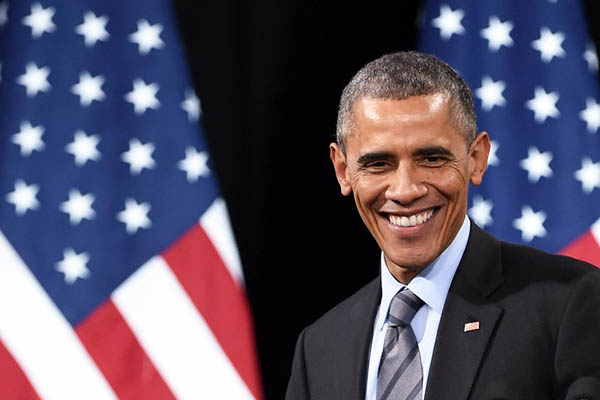
Ethan Miller-Getty Images North America—AFP
Under new agreement, taxes, tariffs on trade are being eliminated across 12 countries.
U.S. President Barack Obama scored a major policy victory with the deal agreed Sunday to establish the Trans-Pacific Partnership, billed as the first trade pact for the 21st century.
The agreement signs on countries representing 40 percent of the global economy, including the United States, Japan, Australia and Canada, to a broad set of rules to enhance free trade and investment, to govern digital trade and protect intellectual property. The TPP is a cornerstone of Obama’s slow-to-gel “Pivot Toward Asia,” with its key goal of preventing China, the world’s number two economy, from filling a void with its own less-free and open standards for trade and investment governance.
“We can’t let countries like China write the rules of the global economy. We should write those rules, opening new markets to American products while setting high standards for protecting workers and preserving our environment,” Obama said in a statement Monday.
The White House highlighted the thousands of taxes and tariffs being eliminated on trade across the 12 countries, but equally important are the effort to harmonize standards, remove unfair competition, and cut bureaucratic barriers to trade and investment in the TPP. It has a long timeframe for implementation, and many hedges and exceptions for various countries that will moderate some of the gains.
To really prove its muscle, the TPP will have to draw in other major countries, both economic powers such as South Korea and large emerging markets like India and Indonesia. South Korea has already said it wants to join.
Still, it was applauded for potentially boosting the sagging global economy. And it could add fuel to Obama’s push for an even more ambitious free-trade pact deal with the European Union, the Transatlantic Trade and Investment Partnership (TTIP) currently under negotiation.
“The agreement is not only important because of the size…. it also pushes the frontier of trade and investment in goods and services to new areas where gains can be significant,” said International Monetary Fund Managing Director Christine Lagarde. “I expect that the TPP can pave the way to a new generation of deep trade integration efforts.”
E.U. Commissioner Cecilia Malmstrom said the talks were good not just for world trade, but also “good news for the trade negotiations between the U.S. and the E.U., because with TPP done, we will be able to approach our TTIP negotiations with an even greater focus from both sides.”
The deal is not complete until all the 12 countries ratify it, and the biggest challenge will be the White House persuading Congress to back it. Members of Congress have already attacked the deal as variously selling out U.S. business and, on the other hand, helping global business at the likely cost of U.S. jobs.
“While the details are still emerging, unfortunately I am afraid this deal appears to fall woefully short,” said Senate Finance Committee chairman Orrin Hatch, a crucial Republican voice on international trade.
Labor and other social groups have warned it could turn out like the North American Free trade Agreement of 1994, which they say sent thousands of U.S. jobs to Mexico and Canada. More broadly, critics say the TPP is not really about free trade but about managed trade, with the main beneficiaries select companies and industries.
Public Citizen, a Washington group, bashed the deal for lengthening protections for drug patents, especially for a cutting-edge category of drugs called biologics. “People everywhere trying to understand why medicine prices are so high find a disheartening answer in the TPP negotiations: The pharmaceutical industry has purchased tremendous influence with political leaders,” said Peter Maybarduk, director of the group’s program on medicines.
TPP critic Adam Hersh of the Roosevelt Institute says that projections of TPP benefits show very little overall to U.S. economic growth, while agreements on auto parts and textile imports will benefit non-TPP members including China.
And he said one of the more controversial chapters of the treaty which allows foreign investors to try to settle disputes with governments in an independent tribunal gives investors great leverage against national laws and policies.
“Most of what the agreement is about is changing the rules on how investors relate to governments,” Hersh told AFP. “It’s been pretty clear that what’s going on here is not about free trade, but which special interests get access to these things.”
